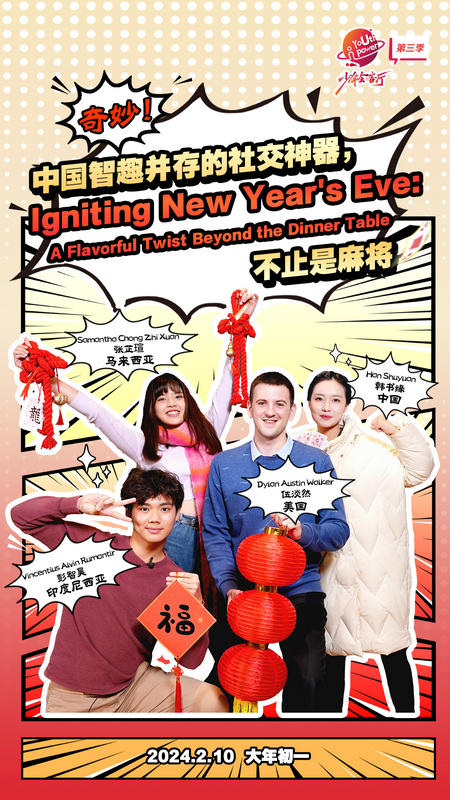

In the latest episode of Youth Power, titled "Igniting New Year's Eve: A Flavorful Twist Beyond the Dinner Table," I had the chance to play guandan with peers from Indonesia, Malaysia, and the United States, introducing them to this classic Chinese card game.
The game involves four players forming two partnerships, seated opposite each other. Armed with a deck of 108 international playing cards, including singles, pairs, straights, full houses, and bombs, the players will try to skillfully play increasingly higher combinations, aiming to empty their hands before their opponents can.
Playing guandan — literally translated as "throwing eggs" — is a tradition in my family during Spring Festival. Every year on Chinese New Year's Eve, after the family dinner, my grandpa would exclaim, "Time for guandan!" And just like that, our cherished family tradition began. We eagerly took our places around the table, ready to dive into the thrilling card battle.
The game not only brought us together but also sparked spirited competition, filled with laughter and joy.
Originating in my hometown, Jiangsu province, guandan emerged in Huai'an during the 1960s. Its popularity spread to neighboring cities, captivating card enthusiasts, including those in Nanjing. Today, over 20 million people from Jiangsu and Anhui provinces engage in this game of strategy and skill. Guandan has transcended borders, enthralling players not only across China but also worldwide.
However, guandan is more than just a game. It encompasses a rich tapestry of Chinese philosophy, imparting wisdom while providing entertainment. Strategic thinking lies at its core, urging players to adopt a holistic mindset. Before each round, we meticulously analyzed the landscape, crafting calculated judgments regarding the sequence and combination of cards. Much like the concept of holistic thinking in Chinese philosophy, guandan demands consideration of various factors, facilitating astute decision-making.
While a number of players adhere to established patterns and sequences, true masters of the game dare to venture into uncharted territories. Breaking free from convention, they craft extraordinary combinations that disrupt opponents' strategies, leading them to victory. This principle also resonates deeply within Chinese philosophy, urging us to think outside the box and embrace innovation.
In the realm of guandan, we learned that the strength of our cards did not solely determine success or failure. Just as in life, fortune can smile upon us, gifting us with a favorable hand, or it can challenge us with a less-than-ideal one. However, our resilience, adaptability, and resourcefulness will ultimately shape our destiny. Guandan taught us that setbacks were temporary, and the true test of character lay in how we responded to adversity.
The game also fosters a strong sense of cooperation among players. As we strategized together, laughter, banter, and occasional friendly taunts filled the air. Through guandan, we strengthened our bonds, nurturing the connections that held our family and friends together. Each victory and defeat became a shared experience, a cherished memory recounted with warmth and nostalgia.
As the scent of our Chinese New Year feast gradually dispersed, the echoes of our guandan battles lingered in the air. The memories we created and the wisdom we gained from this remarkable game will forever occupy a special place in our hearts.
More than a mere game, guandan has become a repository of treasured moments, a testament to our unity, resilience, and the enduring power of family traditions. And so, as another lunar year begins, we eagerly anticipate the continuation of this cherished tradition — one that brings forth laughter, camaraderie, and timeless life lessons to all who embrace its captivating essence.
Written by Han Shuyuan, senior at Tsinghua University.